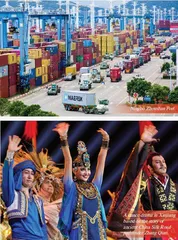Visiting Memories in China
作者: Robert Griffiths

I am fortunate enough to have visited many parts of China since the first occasion in 2006. In my experience, the more you see and study of China, the more you realise how little you know.
Shortly before the Communist Party of Britain’s delegation arrived in Beijing, 16 years ago, the National People’s Congress of China had approved the 11th Five Year Plan. Its main emphasis was on quality rather than quantity in economic development; innovation, research and development, and self-reliance; environmental progress in terms of energy efficiency and reduced pollution; improving public and social services; and reducing inequalities between the regions and between the urban and rural parts of China.
In the Xi’an Hi-Tech Industries Development Zone, we saw how some of these goals were being vigorously pursued. I can still picture in my mind today the impressive facilities and exhibitions on show at various education and research institutes.
One of our delegates, a former car worker, was particularly impressed with the high technical and health and safety standards we witnessed at the Beijing Hyundai Motor Company. Most of the workers on the assembly line were young and we felt a real sense of seeing the creation of a large, industrial working class in front of our very eyes.
Our discussions with the trade unions in that and other factories, and subsequently with the All-China Federation of Trade Unions, have provided a clearer insight into how China’s industrial relations system operates in large urban, industrial workplaces. We learnt how it functions in a very different economic, social and political context to that of developed capitalist economies such as Britain. We were also struck by the openness and honesty of our Chinese comrades, and their willingness to discuss problems and weaknesses in their work.
I have visited older, less technically advanced workplaces such as a very big, state-owned textile factory where, managers and workers were always ready to discuss problems such as quality control and labour productivity, as well as their achievements.
The pressure of rural migration into the cities has stimulated a massive house-building programme which can bring its own problems of adequate urban planning, house-price inflation and corruption. But I will never forget the engineering and aesthetic qualities of so many of the housing and office block developments, including the widespread deployment of solar panelling.
In a more recent visit to Shenzhen, it was possible to see the enormous effort that had gone into planning transport hubs, parks, gardens and shopping malls in and near the new residential areas.
On different visits, I have seen the poorer rural villages such as Chang Fang, where the local CPC members, especially the mayor, playing a vital role bringing the local community together, organising social activities and helping to solve people’s problems.
Yucun village showed how the waste and pollution of earlier industrial development could be cleared away and replaced by a beautifully designed and built residential community, now based on eco-tourism.
Nor can I forget Xiaogang village in 2018, where my partner Irene and I watched a stunning open-air Chinese opera concert. The evening before, we had attended an exhibition of traditional Chinese calligraphy, where a celebrated artist painted a slogan for us in Chinese characters that still hangs on our dining room wall, behind me which reads “Peace in the home, Peace in the world”.
But how different was the port city of Ningbo! I must confess that my abiding memory of that visit in 2011 was the evening banquet for Western European Communists. It demonstrated how port cities everywhere, including my home city of Cardiff, once the biggest coal port in the world, share a common proletarian culture of comradeship and impromptu singing.
Politically, my most vivid memory was a visit to the Xinjiang Uygur Autonomous Region and its capital city, Urumqi. The Uygur language could be heard and seen everywhere. Our liaison interpreters from Beijing had to stand down in our meetings with CPC and municipal officials as local translators fill in for interpreting Uygur to English.
On the outskirts of the capital, we travelled past miles of majestic wind turbines, which power the city and much of the surrounding region.
Shortly after returning to Britain, the president of the anti-China World Uyghur Congress in exile told the European Parliament that the Uygur language and its Arabic script had been suppressed and that all top Party and public officials in Xinjiang were Han Chinese. His speech was widely reported in European newspapers. On many occasions since that time, I have related this episode as a very good reason why people should not automatically believe the anti-China propaganda that appears so often in our mass media.
Xinjiang also deepened my knowledge of how China’s population policy operated in practice, with flexibility in rural areas and in a way which, alongside economic development, has significantly increased the proportion of ethnic minorities in China’s population. This utterly disproves Western claims that the CPC and Chinese government are engaged in a policy of “genocide” against the Uygurs and other minority peoples.